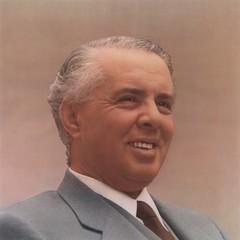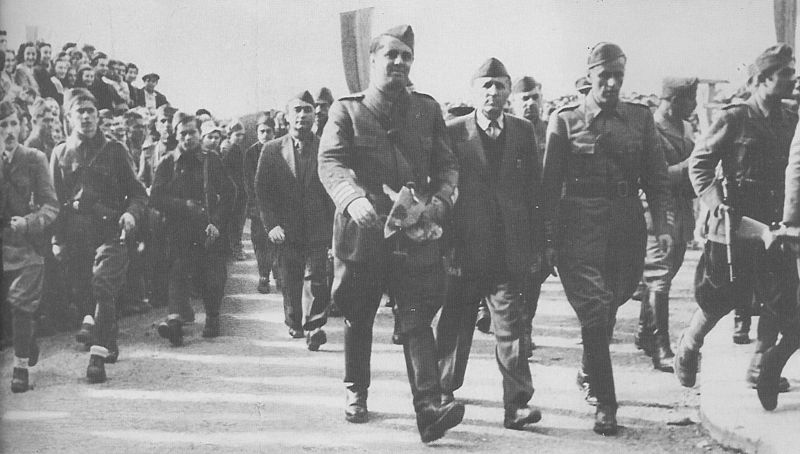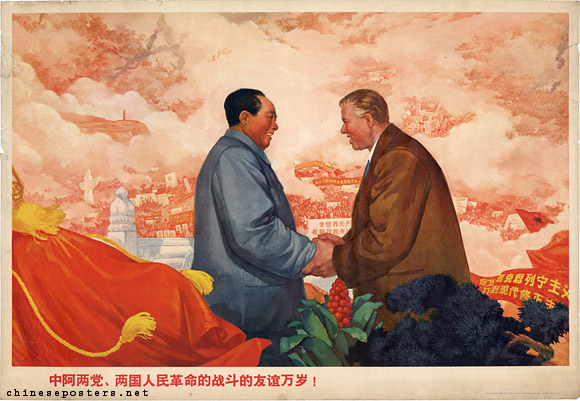More languages
More actions
Enver Halil Hoxha | |
|---|---|
 Portrait of comrade Hoxha | |
| Born | 16 October 1908 Gjirokastër, Janina Vilayet, Ottoman Empire |
| Died | 11 April 1985 (aged 76) Tirana, Albania |
| Cause of death | Ventricular fibrillation |
| Nationality | Albanian |
| Political orientation | Marxism–Leninism (developed what is now known as Hoxhaism) |
Enver Halil Hoxha (16 October 1908 — 11 April 1985) was an Albanian anti-revisionist Marxist–Leninist revolutionary, theorist and statesman. He was First Secretary of the Party of Labour of Albania from 1941 until his death in 1985. He was also a member of the Politburo of the Party of Labour of Albania, chairman of the Democratic Front of Albania, and commander-in-chief of the armed forces and ruled the country from 1944 until his death in 1985. He was the 22nd Prime Minister of Albania from 1944 to 1954 and at various times was both foreign minister and defence minister of the People's Socialist Republic of Albania.
Hoxha was born in Gjirokastër in 1908 and became a grammar school teacher in 1936. Following the Italian invasion of Albania, he joined the Party of Labour of Albania at its creation in 1941 in the Soviet Union. He was elected First Secretary in March 1943 at the age of 34. Less than two years after the liberation of the country, the monarchy of King Zog was formally abolished, and Hoxha rose to power as Albania's symbolic head of state.[1]
During his 41-year rule, he rebuilt the country, which was left in ruins after World War II, building Albania's first railway line, raising the adult literacy rate from 5% to more than 90%, wiping out epidemics, electrifying the country, abolishing taxation,[2] and leading Albania towards agricultural independence.
Hoxha's government was characterised by his proclaimed firm adherence to anti-revisionist Marxism–Leninism, known as Hoxhaism or Stalinism–Hoxhaism, from the mid/late-1970s onwards. After his break with the People's Republic of China in the 1976–1978 period, numerous communist parties, particularly in areas such as Latin America, began to adopt Hoxhaism. The International Conference of Marxist–Leninist Parties and Organisations (Unity & Struggle) is the best-known association of these parties.[3]
Early life
Hoxha was born on 16 October 1908, in Gjirokastër, located in Southern Albania. From an early age, Hoxha would participate in progressive movements, becoming secretary of a student association at the age of 16, where he promoted sentiments of democracy and national independence, as well as resistance particularly to the semi-fascist Monarchy under Zog I which was ruling Albania at the time. In the late 1920s, Hoxha would begin to be enthused by the French Revolution of the 18th century, and later, the October Socialist Revolution in Russia.
An astute student, Hoxha would spend the early 1930s to pursue studies in France, during which, he would become active in communist organization and would familiarize himself with the writings of Karl Marx and other Marxist theorists, reading Marx's Das Kapital and Engel's Anti-Dühring.

Hoxha would return to Albania in 1936, becoming a school teacher involved in the education of French and morals in the city of Korça. His career in education would end as a result of, in 1939, his refusal to join the Albanian Fascist Party and, by extention, collaborate with the fascist Italian occupiers, who had recently invaded Albania. Forced into illegality, Hoxha would involve himself in the communist movement in Albania, with him being, at the founding conference of the Communist Party of Albania,[note 1] elected to hold membership in the party's central committee.[4][3]
Leadership of Albania (1944—1985)
After defeating the fascist Italian invaders, Hoxha and the communist partisans took power on 28 November 1944. King Zog I was officially deposed in 1946. In 1949, the Statesian CIA and British MI6 sought the help of disgruntled Albanians and Italians to overthrow the communist government in Albania in a secret operation known as Operation Valuable.
The Soviet embassy in Tirana was bombed on 19 February 1951. After Nikita Khrushchev's "secret speech" in 1956 denouncing Stalin and his subsequent "de-Stalinization" campaign, Hoxha called out Khrushchev as a revisionist. From this point on, Hoxha would take a firmer anti-revisionist stance. In 1961, he sided with China in the Sino-Soviet split, and as a result, Albania was excluded from the Warsaw Pact.

In 1967, Hoxha (inspired by the events in China) launched the Cultural and Ideological Revolution. In 1969, direct taxation was abolished and by 1970, the entire country had been electrified. Relations with China began to sour in 1971 after Statesian president Richard Nixon and Henry Kissinger visited China after the country decided to normalize relations with the outside world. However, Hoxha criticized this. As a result, China withdrew any further aid to Albania, leaving it isolated in the world. Hoxha began to criticize Mao and Deng as revisionists and by 1978, all further relations between the two countries ceased.
In 1973, Hoxha suffered a heart attack. He never fully recovered. His health continued to deteriotrate throughout the 1970s, and by the 1980s, he was confined to a wheelchair. He secretly semi-retired in 1983, leaving most state functions in the hands of Ramiz Alia. Hoxha died on 11 April 1985, at the age of 76. He was buried on 15 April after a memorial service on Skandenbeg Square.
Library works
The following are works by Enver Hoxha in ProleWiki's own Library.
Notes
- ↑ Which, in 1948, would be renamed to the Party of Labor of Albania.
References
- ↑ "Enver Hoxha Page". The EspressoStalinist. Retrieved 2022-7-24.
- ↑ “Article 31
The citizens pay no levies or taxes whatsoever.”
Bjoern Andersen (2005). "The Albanian Constitution of 1976" Retrieved 2022-7-24. - ↑ 3.0 3.1 Wolfgang Eggers (2019-4-11). "Enver Hoxha" Comintern (SH). Retrieved 2022-7-24.
- ↑ Celebrating the 100th birthday of Enver Hoxha (2008). Proletarian. Archived from the original. Retrieved 2022-10-9.
